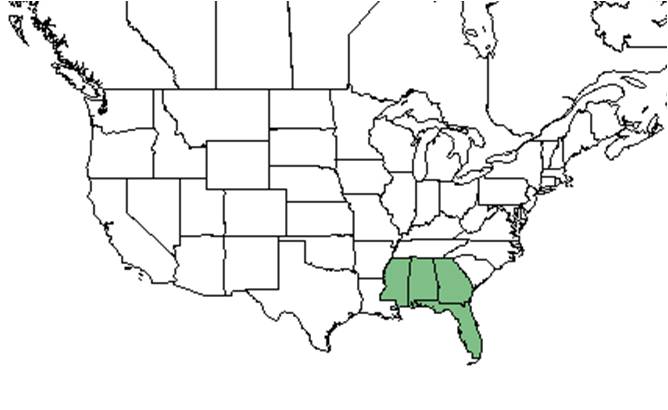Difference between revisions of "Tradescantia roseolens"
KatieMccoy (talk | contribs) |
KatieMccoy (talk | contribs) |
||
| Line 27: | Line 27: | ||
==Ecology== | ==Ecology== | ||
===Habitat=== <!--Natural communities, human disturbed habitats, topography, hydrology, soils, light, fire regime requirements for removal of competition, etc.--> | ===Habitat=== <!--Natural communities, human disturbed habitats, topography, hydrology, soils, light, fire regime requirements for removal of competition, etc.--> | ||
| + | ''T. roseolens'' has been found in white sand rosemary balds with sand pine scrubs and oak scrubs in a mosaic of turkey oak barrens and flatwoods (FSU Herbarium). Associated species include ''Ceratiola, Quercus inopina, Q. geminata'' and ''Q. chapmanii'' (FSU Herbarium). | ||
| + | |||
===Phenology=== <!--Timing off flowering, fruiting, seed dispersal, and environmental triggers. Cite PanFlora website if appropriate: http://www.gilnelson.com/PanFlora/ --> | ===Phenology=== <!--Timing off flowering, fruiting, seed dispersal, and environmental triggers. Cite PanFlora website if appropriate: http://www.gilnelson.com/PanFlora/ --> | ||
===Seed dispersal=== | ===Seed dispersal=== | ||
Revision as of 13:19, 23 November 2015
| Tradescantia roseolens | |
|---|---|
Error creating thumbnail: Unable to save thumbnail to destination
| |
| Scientific classification | |
| Kingdom: | Plantae |
| Division: | Magnoliophyta - Flowering plants |
| Class: | Liliopsida – Monocotyledons |
| Order: | Commelinales |
| Family: | Commelinaceae |
| Genus: | Tradescantia |
| Species: | T. roseolens |
| Binomial name | |
| Tradescantia roseolens Small | |

| |
| Natural range of Tradescantia roseolens from USDA NRCS Plants Database. | |
Common name: longleaf spiderwort
Contents
Taxonomic notes
Description
A description of Tradescantia roseolens is provided in The Flora of North America.
Distribution
Ecology
Habitat
T. roseolens has been found in white sand rosemary balds with sand pine scrubs and oak scrubs in a mosaic of turkey oak barrens and flatwoods (FSU Herbarium). Associated species include Ceratiola, Quercus inopina, Q. geminata and Q. chapmanii (FSU Herbarium).
Phenology
Seed dispersal
Seed bank and germination
Fire ecology
Pollination
The following Hymenoptera families and species were observed visiting flowers of Tradescantia roseolens at Archbold Biological Station (Deyrup 2015):
Halictidae: Lasioglossum nymphalis, L. placidensis, L. puteulanum
Use by animals
Diseases and parasites
Conservation and Management
Cultivation and restoration
Photo Gallery
References and notes
Deyrup, M.A. and N.D. 2015. Database of observations of Hymenoptera visitations to flowers of plants on Archbold Biological Station, Florida, USA.